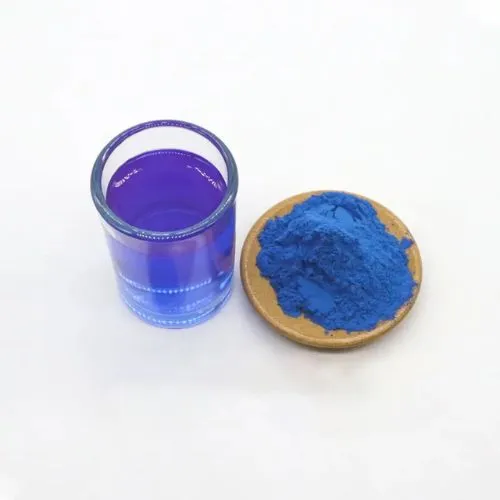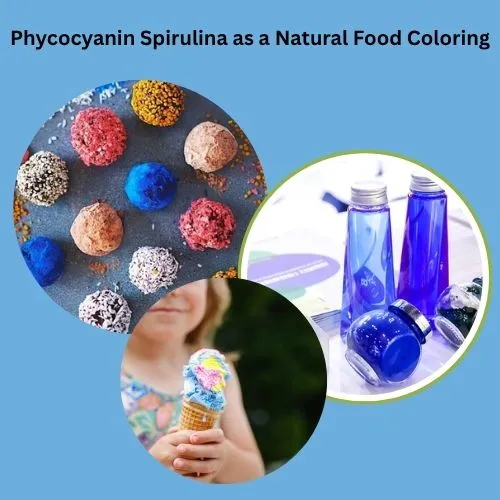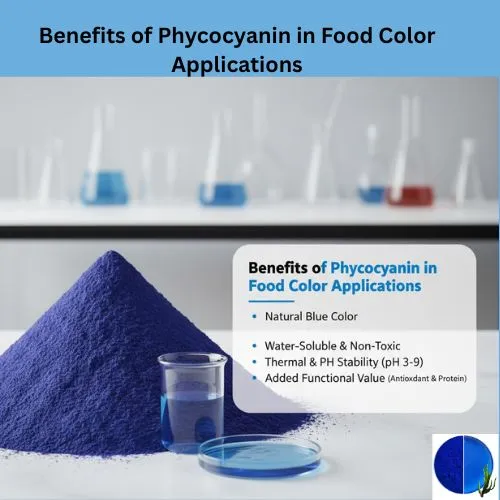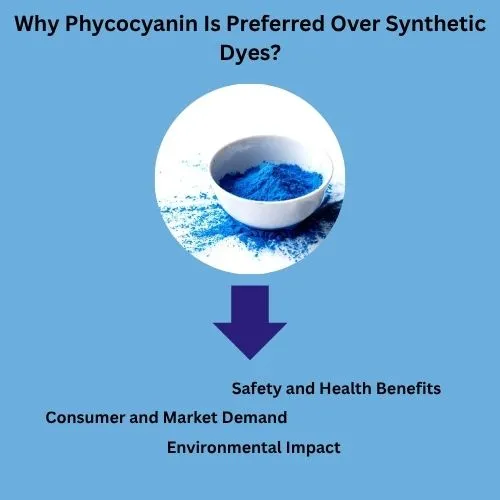What roles does phycocyanin play in food colorants?
In the ever-evolving world of food technology, natural ingredients are gaining prominence, especially when it comes to food coloring. One such revolutionary ingredient is phycocyanin, a vibrant blue pigment derived from spirulina. This article delves into the multifaceted roles of phycocyanin spirulina in food colorants, exploring its applications, benefits, and advantages over synthetic alternatives.

Phycocyanin Spirulina as a Natural Food Coloring
The Origin and Extraction of Phycocyanin
Phycocyanin is a pigment-protein complex present in cyanobacteria, especially spirulina. Extracting this vibrant blue pigment requires careful separation from the algae while preserving its structural integrity. Yangge Biotech, a prominent spirulina-based phycocyanin manufacturer, utilizes advanced extraction methods to guarantee exceptional quality and purity. Their precise processes ensure that the phycocyanin retains its natural properties, making it suitable for various applications in food, cosmetics, and pharmaceuticals, while maintaining the highest industry standards.
Chemical Properties of Phycocyanin
Phycocyanin has distinctive chemical characteristics that make it an excellent natural food colorant. Its molecular structure ensures high water solubility, allowing seamless incorporation into a wide range of food products. The pigment remains stable under neutral to mildly acidic conditions, which is essential for preserving its bright blue color across different food formulations. These properties make phycocyanin a versatile and reliable choice for manufacturers seeking a natural, vibrant, and functional coloring agent.
Versatility in Food Applications
The versatility of phycocyanin spirulina as a food colorant is remarkable. It can be used in a wide range of products, including beverages, confectionery, dairy products, and even baked goods. Its ability to create stunning blue hues and, when combined with other natural colorants, a spectrum of greens and purples, opens up a world of possibilities for food manufacturers seeking to create visually appealing products without synthetic additives.

Benefits of Phycocyanin in Food Color Applications
Enhanced Visual Appeal
Phycocyanin’s striking blue color can greatly improve the visual attractiveness of food products. Being naturally derived, it appeals to consumers who prefer clean-label ingredients. Its vivid hue helps products capture attention on store shelves, enhancing their overall presentation and market appeal. By combining natural origin with eye-catching color, phycocyanin not only elevates product aesthetics but also aligns with current consumer trends, making it a valuable addition for manufacturers aiming to boost both appeal and competitiveness in the marketplace.
Nutritional Value
Unlike artificial food colorants, phycocyanin offers added nutritional advantages. It is abundant in antioxidants and is linked to multiple health benefits, such as supporting immune function and reducing inflammation. Serving as both a natural colorant and a functional ingredient, phycocyanin spirulina enhances the value of food products that include spirulina. This combination of vibrant coloration and health-promoting properties makes it an attractive choice for manufacturers seeking to create foods that are visually appealing and nutritionally beneficial.
Clean Label Appeal
The clean-label movement is rapidly growing in the food industry, as consumers increasingly seek transparency and natural ingredients. Phycocyanin, sourced from spirulina, fits seamlessly into this trend. Its incorporation enables manufacturers to label products with terms like "spirulina extract" or "blue-green algae extract," resonating with health-conscious buyers. By using phycocyanin, brands can meet consumer demand for natural, recognizable ingredients while providing vibrant color, enhancing both product appeal and trustworthiness in a market that values clean and transparent labeling.

Why Phycocyanin Is Preferred Over Synthetic Dyes?
Safety and Regulatory Approval
Phycocyanin has gained approval from leading food safety authorities globally, including the FDA and EFSA. Derived from natural sources and supported by extensive safety research, it serves as a safe alternative to synthetic blue dyes, some of which have raised health concerns. This regulatory endorsement offers reassurance to manufacturers and consumers alike, highlighting its reliability and safety for use in food products while meeting modern demand for natural, health-conscious ingredients.
Environmental Sustainability
The production of phycocyanin spirulina is environmentally sustainable. Spirulina cultivation requires minimal land and water resources compared to traditional crops. Additionally, it can be grown in controlled environments, reducing the need for pesticides and herbicides. This sustainability aspect aligns with the growing consumer demand for environmentally responsible products.
Stability and Performance
While synthetic dyes often boast superior stability, advancements in phycocyanin production and formulation have significantly improved its stability in various food applications. When properly formulated, phycocyanin can maintain its vibrant color under various processing conditions, rivaling the performance of synthetic alternatives while offering the benefits of a natural ingredient.

Conclusion
Phycocyanin plays a pivotal role in the food colorant industry, offering a natural, versatile, and sustainable alternative to synthetic blue dyes. Its ability to enhance visual appeal while providing nutritional benefits makes it a valuable ingredient for food manufacturers aiming to meet consumer demands for clean-label products. As the food industry continues to evolve towards more natural solutions, phycocyanin stands out as a shining example of innovation in natural food coloring.
For those looking to incorporate this remarkable ingredient into their products, Yangge Biotech offers high-quality phycocyanin spirulina. As a leading manufacturer, we provide FDA-approved, Kosher and Halal certified phycocyanin, ensuring the highest standards of quality and safety. Elevate your food products with Yangge Biotech's premium phycocyanin spirulina. As industry leaders in natural plant extracts, we offer KOSHER/USP GRADE phycocyanin spirulina, perfect for food, beverages, and health supplements. Our dedicated R&D team ensures innovative solutions tailored to your needs. Experience the difference with our high-quality, certified products. Contact us at info@yanggebiotech.com to transform your products naturally.
FAQ
Q: Can we get some samples to test before purchasing?
A: Of course, we can provide free samples of 20 to 100 grams, but the shipping cost is at the customer's expense. The shipping cost can be deducted from the next order, or the samples can be sent through your courier account.
Q: Do your products have relevant certifications?
A: Yes, our products are certified for HALAL, ISO, HACCP, Kosher, and other certifications.
Q: What is the minimum order quantity (MOQ)?
A: Small batches of samples can be customized according to your requirements.
Q: Do you offer OEM and ODM services? Can the formula be customized based on our own?
A: Of course, we provide ODM and OEM services to many customers. Our product range includes softgels, capsules, tablets, sachets, granules, and private label services. Simply contact us and let us know your requirements. Our experienced R&D team can also develop new products with specific formulas.
Please contact us to design your own branded products.
Q: How do you handle quality complaints?
A: First, we have a comprehensive quality control SOP. We provide authoritative third-party inspection reports for almost all products before shipment to minimize the possibility of quality issues. Second, we have a comprehensive return and exchange procedure. If there is a genuine quality dispute, we will strictly follow the SOP.
Q: How do you ship? How long does delivery take?
A: For small orders, we typically use DHL, UPS, EMS, FedEx, or TNT. Delivery typically takes 3-7 days. We also offer air and sea freight services. We have a strong freight forwarding team and can provide you with a one-stop service, including DDP and DDU.
Q: What are your payment terms?
A: 100% prepayment, payable by T/T, Western Union, MoneyGram, or PayPal.
Q: What is the shelf life of your products?
A: 2 years with proper storage.
Q: Is the packaging environmentally friendly?
A: We attach great importance to environmental protection and are constantly improving our product packaging. Some products are packaged in recyclable paper. Packaging materials are carefully selected to ensure product safety during transportation and storage, and to minimize environmental impact. We are committed to achieving a balance between environmental friendliness and practicality in our product packaging, and to contributing to sustainable development.
References
1. Johnson, A. K., & Smith, B. L. (2021). Phycocyanin: A Natural Blue Colorant for the Food Industry. Journal of Food Science and Technology, 58(4), 1223-1235.
2. Fernández-Rojas, B., Hernández-Juárez, J., & Pedraza-Chaverri, J. (2020). Nutraceutical properties of phycocyanin. Journal of Functional Foods, 67, 103849.
3. Liu, Q., Huang, Y., Zhang, R., Cai, T., & Cai, Y. (2019). Medical Application of Spirulina platensis Derived C-Phycocyanin. Evidence-Based Complementary and Alternative Medicine, 2019, 1-14.
4. Chaiklahan, R., Chirasuwan, N., & Bunnag, B. (2022). Stability of phycocyanin extracted from Spirulina sp.: Influence of temperature, pH and preservatives. Process Biochemistry, 47(4), 659-664.
5. Newsome, A. G., Culver, C. A., & van Breemen, R. B. (2018). Nature's Palette: The Search for Natural Blue Colorants. Journal of Agricultural and Food Chemistry, 62(28), 6498-6511.

Based on your location and order quantity, you will have the opportunity to receive a limited time free shipping promotion!

Who we are


